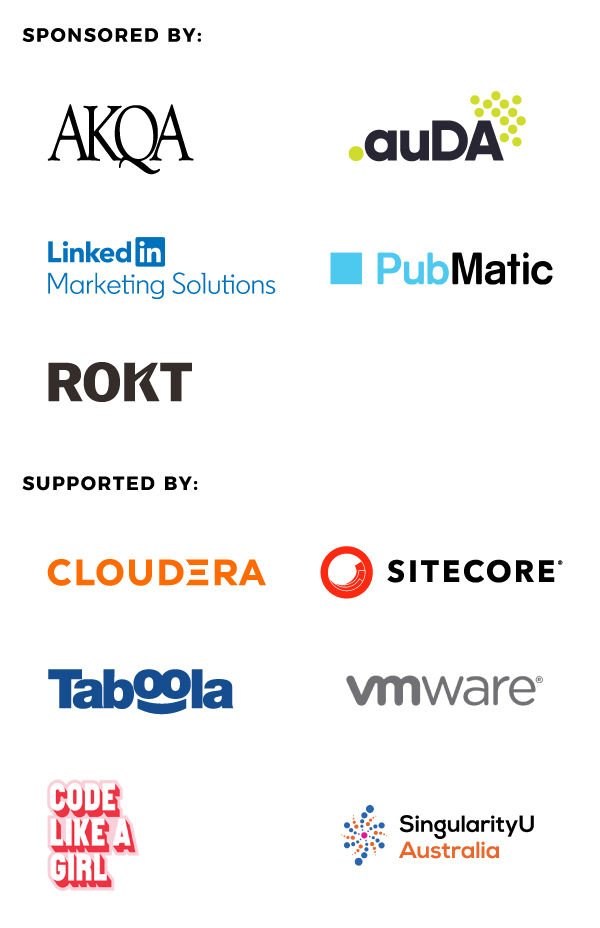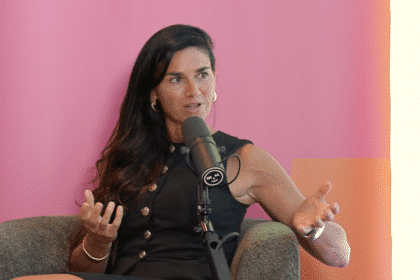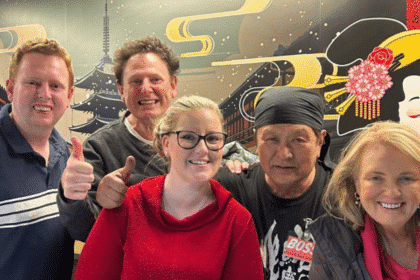In 2020, Mohadeseh Ganji took home the Women Leading Tech award for data science. A year on, B&T chats with the leader in data science and AI about how she balanced work/life in 2020 and how more women can be welcomed into STEM careers.
The Women Leading Tech Awards are back for another year in a virtual format after its inaugural event in 2020, with tickets now available for the awards.
In the lead-up to the 20 April event, B&T is speaking to some of the event’s past winners, asking questions big and small around the problems, and solutions, for achieving greater outcomes for women in technology.
Mohadeseh Ganji is ANZ bank’s head of data science, an honorary fellow of the University of Melbourne, and the 2020 winner of the data science category at WLT.
Recently, I had the chance to ask Ganji how she would welcome more women into STEM careers, with the tech expert and PhD revealing that it all starts at school and in family life.
“Adding images of female mathematicians or scientists in education materials and having female tech leaders as role models can make a huge difference,” she tells B&T.
There’s that and more in this Q+A with our Women Leading Tech winner, Mohadeseh Ganji.
B&T: Mohadeseh, what was your initial reaction to winning a Women Leading Tech award?
MG: I was elated to win the award. The award ceremony was held online and it was a very different feeling to attend an award Gala online. When my name was called out as the winner of the Women Leading Tech award in the data science category, it was really a mixture of positive feelings.
I was very excited and happy for being honoured to receive such a prestigious award. I was grateful for all the opportunities that were given to me in my career and through people that I worked with. At the same time, I had a reassuring feeling that “everything is possible, you just need to set goals, work hard and stay focused!”
We know that a lot has changed in the world since you entered into the awards last year. What has changed for you professionally?
It was over a year ago that I was referred for entering into the award. For me professionally it has been a big year with several opportunities to bring data and people together to deliver major analytics projects both at Mondo and ANZ bank.
I joined ANZ bank in March 2020 as the head of data in the home loans business. My role is setting and executing data strategy, uplifting data and data science capability and driving data agenda in home loan’s automation program. Entering into a new industry and learning about it has been a steep learning curve which I have been enjoying. Working with a supportive and passionate team on exciting and high impact initiatives with a strong mission on helping customers in their home buying journey has been a rewarding professional year for me.
I have also continued my engagement with the University of Melbourne and stayed connected to the analytics community virtually. Everything going virtual actually meant I could attend and give speeches at conferences and meet with professionals from other cities and countries. I am glad I could continue expanding my professional network, giving back to the analytics community and achieving my learning and development goals for the year.
How much time do you spend on a computer per day? How do you balance screen time with everyday life?
My role at ANZ involves a lot of meetings and interactions with people. If the world’s situation was similar to one year ago, my response to this question would have been very different, because having more interactions and meetings meant I would have spent less time on my computer. However, with the pandemic and working from home, pretty much all my working day is spent on the computer.
That means to keep a healthy balance I need to remind myself to take a break and have a short walk or stretch muscles between my meetings. If weather allows, I attend some meetings while going for a walk outside to get some fresh air. To maintain a clear line between work and family hours, I often (not always unfortunately), start and finish work at certain times and try to switch off after work to spend quality time with my family.
I believe it is very important for everyone especially for leaders to maintain a healthy work life balance to stay productive and also to set an example for their team.
What are some structural changes you believe could be made at the education level to help improve diversity and inclusion in technology?
I believe the biggest barrier for girls entering tech or data science is the mindset that is being cultivated at early school ages that boys are better than girls at tech and science. Even at high school it is generally perceived that tech roles are more suitable for boys.
It is an unwritten and unintended part of the education system and the family/social culture that cultivates such stereotypes in the minds of our kids and teenagers. Adding images of female mathematicians or scientists in education materials and having female tech leaders as role models can make a huge difference. I believe in changing those stereotypes and helping our younger generation girls open up new doors of opportunities for their future.
How does your role combine creativity and technology?
I have the pleasure of working with an amazing team at ANZ bank. I spend a lot of time discussing complex problems with my team and colleagues, trying to both find solutions to immediate problems the business and customers are facing and also take the learnings to build and uplift capabilities of the future.
The beauty of data science is that it not only solves problems but helps businesses to ask better questions, and I think that’s when creativity starts: when you are able to question the status quo, discover patterns and unknowns about your business processes or customer behaviours that data can bring to surface.
From there on, there is an essence of creativity in every step of applying technology/data science, both from the technical/algorithmic development perspectives and from the implementation and process/change management aspect.
As much as I am fascinated about the advances that are arising in data science and particularly in the artificial intelligence space, I am passionate about applying and embedding them in business processes, because that’s where the real value starts to reveal itself in the forms of tangible impact.
How have you had to develop your skills throughout your career to bring technology and creativity together?
Throughout my career, I have been given a lot of opportunities to learn through problem solving and innovation.
I have had the pleasure to work on the end-to-end data science and artificial intelligence lifecycle both in research and in commercial worlds and I learned to combine creativity in every step.
When I was doing my PhD and in my time as a research fellow and lecturer at University of Melbourne, the core part of my role was proposing and testing creative ideas in the field of artificial intelligence to improve existing methods or create new and more effective machine learning and AI algorithms.
When it comes to commercial/industry experience, the application of creative thinking requires thinking out of the box in the business context and being able to solve business problems through technology. Through that experience I improved my storytelling as well as leadership skills. Being able to put complex technology in simple words and articulating the impact and benefit of it clearly is a key skill that was gained through applying technology in business context.
What do you do to develop your leadership style?
Throughout my career, I have had the opportunity of working with and learning from great people and remarkable leaders looking upon whom have helped me shape my leadership style.
I also actively work on improving in every aspect of my leadership style by reading leadership development books, and taking online leadership courses.
Reflecting on my own and others’ leadership actions, decisions and outcomes is also a great way to learn and avoid mistakes of the past.
Entries for the 2021 Women Leading Tech awards close on Monday, 1 March. To submit your entry, click here.
The Women Leading Tech Awards will be hosted virtually on Tuesday, 20 April.
If you’d like more information on the event, head to this website.
Thank you to our incredible sponsors and supporters for making this event possible.









